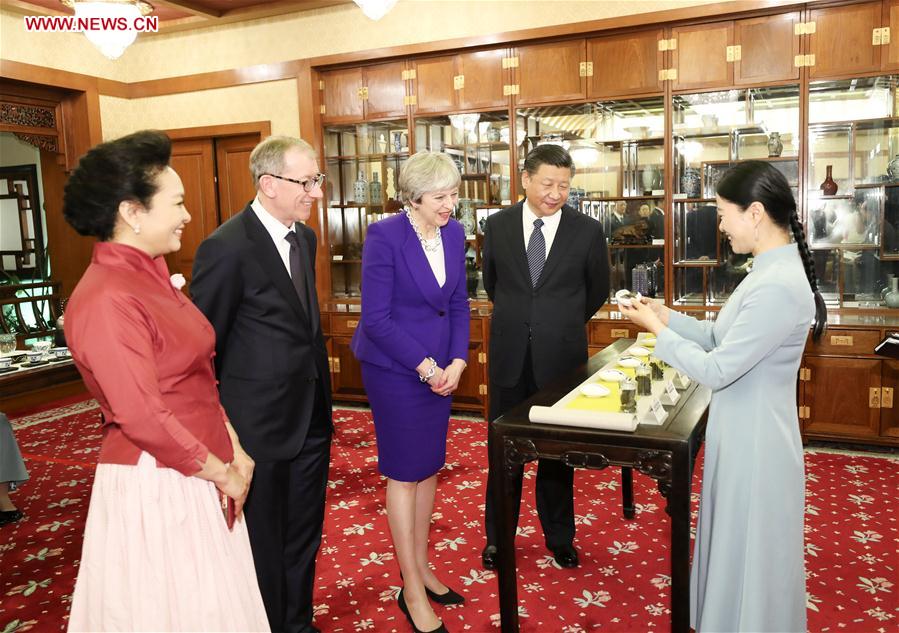Media Report

- The Washington Post reports: "British Prime Minister Theresa May said Friday she discussed with Chinese President Xi Jinping the importance of removing barriers to commerce, especially for British food, drink and financial services, as the two countries move toward a future trading arrangement for after the United Kingdom leaves the European Union. May said the two leaders in their Thursday discussions agreed on a "trade and investment review" as a first step to future bilateral arrangements. 'As President Xi, quoting Shakespeare, said to me yesterday, what's past is prologue. And I wholeheartedly agree. The U.K. and China are opening a new chapter in our golden era,' May said. May discussed her meeting with Xi at a conference in Shanghai where she was introduced by the founder of Chinese online shopping giant Alibaba, Jack Ma. She is to fly home later Friday, capping a three-day, three-city visit to China."
- CNBC reports: "China's continent-spanning network of infrastructure investments — known as the Belt and Road Initiative — keeps expanding. So do the legal risks. Multi-jurisdictional dealings between Chinese entities and their emerging market counterparts can pose immense regulatory challenges, especially in the realms of financing and execution. To address trade and investment disputes along the Belt and Road, the world's second-largest economy intends to establish international courts in Beijing, Xi'an and Shenzhen, local media reports announced last week. The new institutions will be based on Beijing's existing judiciary, arbitration and mediation agencies, according to state-run media outlet Xinhua. There are concerns, however, that the China-led legal system will favor local parties over foreign players... Excessive Chinese control is a frequent complaint about President Xi Jinping's initiative to boost Beijing's economic influence throughout Asia and Europe, with the government deciding which countries get funding and when. Critics have said Beijing is using the multibillion-dollar program of railways and ports to push its political and economic agenda in the developing world."
- Foreign Policy comments: "China's trillion-dollar signature foreign-policy project, the Belt and Road Initiative, is often lampooned as just a fuzzy concept with little to show for it on the ground. But in bustling ports from Singapore to the North Sea, state-owned Chinese firms are turning the idea into a reality with a series of aggressive acquisitions that are physically redrawing the map of global trade and political influence. A pair of deep-pocketed Chinese behemoths, Cosco Shipping Ports and China Merchants Port Holdings, have gone on a buying binge of late, snapping up cargo terminals in the Indian Ocean, the Mediterranean Sea, and the Atlantic rim. Just last month, Cosco finalized the takeover of the terminal in Zeebrugge, Belgium's second-biggest port, marking the Chinese firm's first bridgehead in northwestern Europe. That deal followed a raft of other acquisitions in Spain, Italy, and Greece in just the last couple of years. Chinese state firms, which once kept close to their home market, now control about one-tenth of all European port capacity. The port deals are one of the clearest manifestations of Beijing's ambitious plans to physically link China to Europe by sea, road, rail, and pipeline.The port deals are one of the clearest manifestations of Beijing's ambitious plans to physically link China to Europe by sea, road, rail, and pipeline. The ports underpin the maritime half of the Belt and Road Initiative, snaking from the South China Sea across the Indian Ocean, through the Suez Canal and into the soft underbelly of Europe... The port deals, and other infrastructure projects associated with the Belt and Road in Central and Eastern Europe, threaten to politically hive off vulnerable members of an already tottering European Union, said van der Putten of the Netherlands Institute."
Calendar
- 2018-02-01 China believes in free and fair trade too, Mr Trump
- 2018-01-31 Don't Fear China's Arctic Takeover
- 2018-01-30 U.S. companies complain of unfair treatment in China, want pressure but not war
- 2018-01-29 The Trump team’s idea to counter China with nationalized 5G is just what China would do
- 2018-01-28 At Davos, the Real Star May Have Been China, Not Trump
- 2018-01-26 'Globalism with Chinese characteristics' is on display in Davos. But it's not everything it seems
- 2018-01-25 U.S. imposes more North Korea sanctions; urges China, Russia expulsions
- 2018-01-24 What could China do in a US trade war?
- 2018-01-23 U.S. Tariffs, Aimed at China and South Korea, to Hit Targets Worldwide
- 2018-01-22 Trump’s moment of truth on China has arrived
News
- The Washington Post Britain's May discusses trade barriers with China's Xi
- CNBC China's plans for creating new international courts are raising fears of bias
- The Washington Post Possible deal between Vatican and China alarms many Catholics
- CNBC China's currency is still nowhere near overtaking the dollar for global payments
- Quartz The fate of Apple's iPhone X in China will be decided this month
- CNBC Warren Buffett, already the 'god of stocks' in China, has $100 billion reason to invest more there
- TIME More Than a Dozen Hurt as Van Crashes Outside Starbucks in Shanghai
- The Verge How WeChat came to rule China
- NBC News 'Female morality schools' spark storm of criticism in China
- Bloomberg China Considers Legal Gambling on Hainan Island
- Voice Of America Turnaround Seen for US-Philippine Ties; China Wary
- Bloomberg Top Challenges Facing Macau If China Casino Monopoly Ends
Commentary
- Foreign Policy Why Is China Buying Up Europe's Ports?
- The Economist Pyramid schemes cause huge social harm in China
- The Guardian How China really perceives 'Auntie May'
- The New York Times Cash-Strapped Chinese Giant Taps a New Money Source: Its Workers
- Forbes The NFL Isn't Just Trying To Win Football Fans In China -- It's Planning Its Online Mobile Leap
- NPR China Is Attempting To Muzzle #MeToo
- Forbes China Lays Groundwork For Asian, World Lead In 3D Printing
- Foreign Policy China's Middle Class Is Pulling Up the Ladder Behind Itself